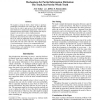Free Online Productivity Tools
i2Speak
i2Symbol
i2OCR
iTex2Img
iWeb2Print
iWeb2Shot
i2Type
iPdf2Split
iPdf2Merge
i2Bopomofo
i2Arabic
i2Style
i2Image
i2PDF
iLatex2Rtf
Sci2ools
129
click to vote
AAAI
2006
2006
Mechanisms for Partial Information Elicitation: The Truth, but Not the Whole Truth
We examine a setting in which a buyer wishes to purchase probabilistic information from some agent. The seller must invest effort in order to gain access to the information, and must therefore be compensated appropriately. However, the information being sold is hard to verify and the seller may be tempted to lie in order to collect a higher payment. While it is generally easy to design information elicitation mechanisms that motivate the seller to be truthful, we show that if the seller has additional relevant information it does not want to reveal, the buyer must resort to elicitation mechanisms that work only some of the time. The optimal design of such mechanisms is shown to be computationally hard. We show two different algorithms to solve the mechanism design problem, each appropriate (from a complexity point of view) in different scenarios.
AAAI 2006 | Elicitation Mechanisms | Information Elicitation Mechanisms | Intelligent Agents | Seller |
Related Content
| Added | 30 Oct 2010 |
| Updated | 30 Oct 2010 |
| Type | Conference |
| Year | 2006 |
| Where | AAAI |
| Authors | Aviv Zohar, Jeffrey S. Rosenschein |
Comments (0)

